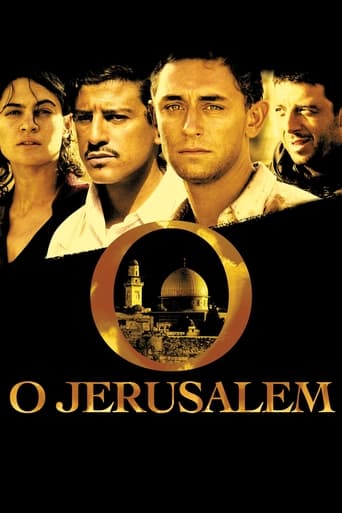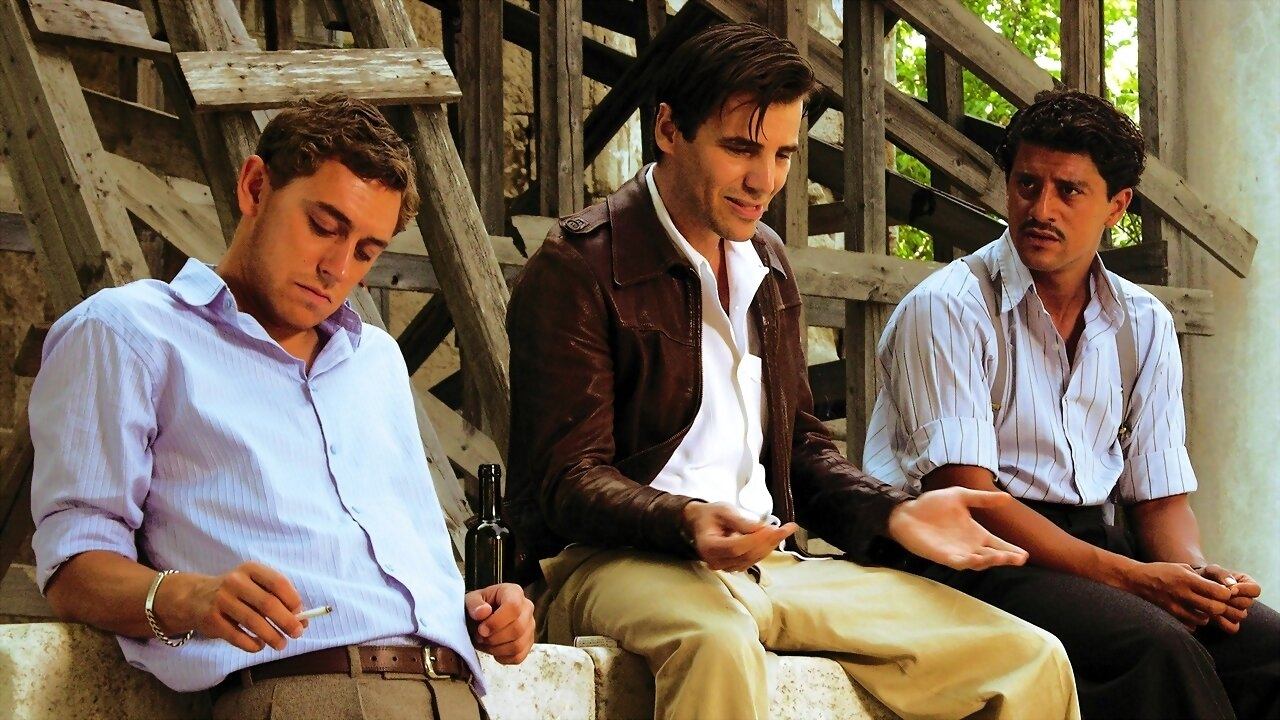monahanwilliam
This is my first crack at critiquing a movie on IMDb. I saw it last night and thought the movie makers did a good job at expressing their point of view, which I also thought was very well worth considering. Someone had posted a very negative review, and then warned to stay away from the movie; the next reviewer replied to that by making a statement about the subjectivity of truth. I wanted to post my agreement to the second reviewer. I think what should be stayed "away" from is suppressing information just because the suppressor does not understand the value of the information. The movie "O Jerusalem" portrays little known facts about some well known characters (David Ben-Gurion, Golda Meir, King Hussein, etc.), as they might have related to Jewish and Arab fictional characters who lived in America and were friends, during the birth of the nation of Israel. These fictional friends all went to Jerusalem, and were separated through their participation in activities on opposing sides of the conflict. Blood brothers, separated by opposing political views, and eventually finding themselves fighting each other during the American Civil War, comes to mind. What the movie "O Jerusalem" portrays may not have actually happened, but it is easy to see that it could have happened.
d-shayne
My major gripe is not the slant, the film was not a propaganda screed for either side, but it is so inaccurate as to be nearly worthless. First, any one who spent any time in Israel will note immediately that it was not filmed there, the scenes do not remotely resemble the real sites where the events of 1948 took place. Major facts are fumbled--e.g., the Jewish Quarter of the Old City fell long before the first cease-fire (from the movie, it is hard to tell exactly what happened). In another scene, right before the Partition vote travelers are shown on a modern-style glass bus from Tel Aviv to Jerusalem--going over a non-existent river--with Arabs and Jews on the same bus! The acting is TV-grade melodrama and the script is trite.As for the overview-historical content, the movie falls to illuminate the events the lead up to the conflict--and with the single exception of the depiction of Deir Yassin, makes it seem as though the war was fought between a handful of well-meaning nice guys. But the 1948 war was bloody and ugly, with many atrocities committed on both sides, but especially the Arab side that was trying to wipe out the Jewish community of Palestine (later Israel).Finally, as already pointed out, this movie does horrible violence to LaPierre and Collins' fine book, one of the few truly even-handed non-fiction books written about the Arab-Israel conflict (In the trailer, even this was mangled as the book is called a "novel"). If any one wants to see a much better movie covering almost the exact same topic get "Cast a Giant Shadow."
plkldf
I enjoyed this film and I'm going to review it instead of discussing the pros and cons of Israel/Palestine.I saw it at Cinema Sundays at the Charles, here in Baltimore MD USA.In the interest of full disclosure, I am not Jewish, and I am anti-Israel and pro-Palestine.At Cinema Sundays, the host is Jewish, and this week's discussion leader is also Jewish -- I think I'm safe in saying it's a largely Jewish group which goes to Cinema Sundays and attended this screening. Although a show of hands said that more liked it than disliked it, the host and discussion leader didn't like it at all --- the discussion leader had even skipped the pre-screening the day before -- his reason seemed to boil down to he had better things to do.The discussion was largely (but not all) panning the film.I thought (with one glaring exception, which I won't reveal here) that the movie was balanced, while telling the story primarily from the Jewish side. In the foreground, it concerns an American Jew and an Arab Palestinian who meet in the U.S. and become friends. Each finds himself going to Palestine in 1947, knowing that a conflict is coming, a struggle for control of the land. The story of these two men and their friends and lovers is in the foreground, and in the background is the story of the British leaving Palestine, and the U.N. vote for partition.There's a fair amount of violence, sudden, unexpected violence realistically portrayed. However, there's no enjoyment of the mayhem, and but little glorification of it.I felt well-informed by the movie in terms of its telling of the story of the birth of Israel. I think this is good story-telling -- although, of course, the two main characters keep encountering each other even after they split up - well, duh, it's a movie about these two characters! :o) A little cinematic license. There's a very touching and emotional scene near the end which had me riveted.I think the story is told relatively objectively (which is to say, more objectively than, say, 90% of news coverage here in the USA, which overwhelmingly favors Israel) while holding out hope for reconciliation between Arabs and Jews in Israel/Palestine. And, I have to say, I think that's why so many people at Cinema Sundays disliked the movie, without really being able to articulate why ("I've seen this all before, oversimplified, unlikely...") -- because it was objective and told the Arab side, and portrayed the Palestinians as human beings who suffered in the partition.I give it an 8 because of the one pulled punch, which I thought destroyed the balance of the film. I'll discuss that on the Message Boards, as I don't want to Spoil the movie.
Dr Jacques COULARDEAU
We had expected that film for decades and we finally get it. The absolute irresponsibility of the English in Palestine, the horrendous tragedy of nazism symbolized by the concentration camps as the final solution to the Jewish problem, the extreme barbarity of the extremist Jewish groups, the naive complacent blindness of many on both sides, these are the main reasons why the creation of Israel was more tragic than it should have been. Instead of a multicultural and multi-ethnic state, Isarel was founded as a Jewish state, that is to say a state whose definition was purely religious. For millenia the Jews and the Arabs had lived in normal peaceful relations, except when the Christians decided to come and crusade around in the Middle East, but suddenly the absolute absurdity of the international community was to find the berserk compromise of splitting Jerusalem in two, as a collateral decision of the creation of a Jewish state. Since 1948 the situation has little changed and it is war after war, a quasi permanent state of war. The film is admirable because it follows the historical situation through the eyes of a few young people who knew and loved one another deeply before coming to Palestine, in fact in New York, one Arab, three Jews and one Christian. It thus becomes the story of the uprooting of these friendships and loves, the impossible uprooting that dramatizes every step in this struggle, on both the Jewish and the Arab sides, and makes it become little by little more and more cosmic in the emotional intensity it assumes day after day, night after night. To marry the woman you love in the very last five minutes of her life erases any religious dimension in the ceremony that only becomes the mark of the deepest suffering of all : the suffering of a hope that seems to glide away with a sneer from your grip, especially when one of the witnesses of this Jewish wedding is the Arab friend of the two aspiring husband and wife and the son of the leader of the Arab community who was killed in the fight by the very bridegroom. This is a rewriting of the impossible love of so many tragedies, and first of all Romeo and Juliet, but in such a different context that it becomes a divine surprise that can easily lead to the rebirth of the hope that may have died in the meantime, but a hope that lives and strives in our own minds that one day soon Jerusalem will finally no longer be cut by a wall, that one day Palestine will be one again, in a way or another, for both the Jews and the Arabs, equal in dignity, equal in history, equal in faith and equal in love. When will dates be shared again and the agenda of Palestine be moving along one unified line. Here is the film we had all hoped would come one day like the prophet announcing the real Second Coming of peace on this earth for all the children of the only and yet multiple, or even absolutely non-religious, God of all men and women of good faith and quivering heart. We know it should be soon, but how soon we don't know. Suffering has been bad enough for it to stop now, at once, instantly, immediately. That is at least my deepest wish because we all have to love the Jews and the Arabs as our direct soul-brothers. But there are so many bitter intentions among us that love may wither away and eventually even die.Dr Jacques COULARDEAU, University of Paris Dauphine & University of Paris 1 Pantheon Sorbonne


 AD
AD
